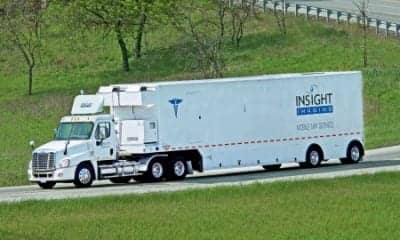Hyperfine is initiating a global research program supported by a $1.6 million grant from the Bill & Melinda Gates Foundation to investigate whether portable MRI in low-resource countries without readily accessible MRI technology can identify and potentially mitigate labor- and delivery-related brain damage resulting in HIE (hypoxic ischemic encephalopathy) in infants.
HIE is caused by birth asphyxia or limited blood flow to the brain, often occurring before or during birth, and is estimated to affect about 1.5 births per 1,000 live births.According to the World Health Organization, it is the fifth-leading cause of death worldwide in children under the age of 5, with the incidence of HIE higher in countries with limited resources.
The most important current treatment for HIE is therapeutic hypothermia (cooling the infant’s brain), and current guidelines recommend that this treatment commence as soon as possible after the injury and within six hours of birth. Swoop portable MRI could enable rapid identification of HIE, providing time-critical decision-making support to deploy therapeutic hypothermia as soon as possible.
The foundation’s interest in the program, as part of its focus on maternal, newborn and child health, stems from the utility and applicability of low-field MRI to deliver accessible neuroimages that could identify birth asphyxia-related brain injuries and provide an opportunity for therapeutic intervention. In addition, portable MRI technology could assess brain volume and detect malnutrition in the first year of life, providing an opportunity for early nutritional interventions.
The foundation’s grant will support the deployment of 20 Swoop devices to investigators and will fund the program for the next two years. Ten devices will be sent to leadership sites to validate protocols for research programs and explore data outcomes, and another 10 devices will be sent to lower resource settings in which birth-related brain injuries and malnutrition are persistent and access to MRI technology is limited. The Swoop devices will start shipping to identified sites in 2020, and all 20 systems will be delivered by the spring of 2021.
“The impact of maternal anemia, malnutrition, infection, and birth-related brain injury in less-developed countries is very worrying,” comments principal investigator, professor Steve Williams from Kings College London. “By creating unprecedented access to this pioneering technology, we will learn to assess and manage brain health for a wide range of clinical conditions. We are extremely enthusiastic about the potential impact this could have on babies and their families in the future.”
“We are a mission in the form of a company—to make MRI accessible and affordable to everyone—and this research program is a perfect example of realizing that vision,” says Khan Siddiqui, Hyperfine’s chief medical officer. “We are so appreciative of the support from the foundation to help us improve the lives of mothers and children in underdeveloped countries by providing immediate and affordable access to the technology they need to improve patient outcomes.”






